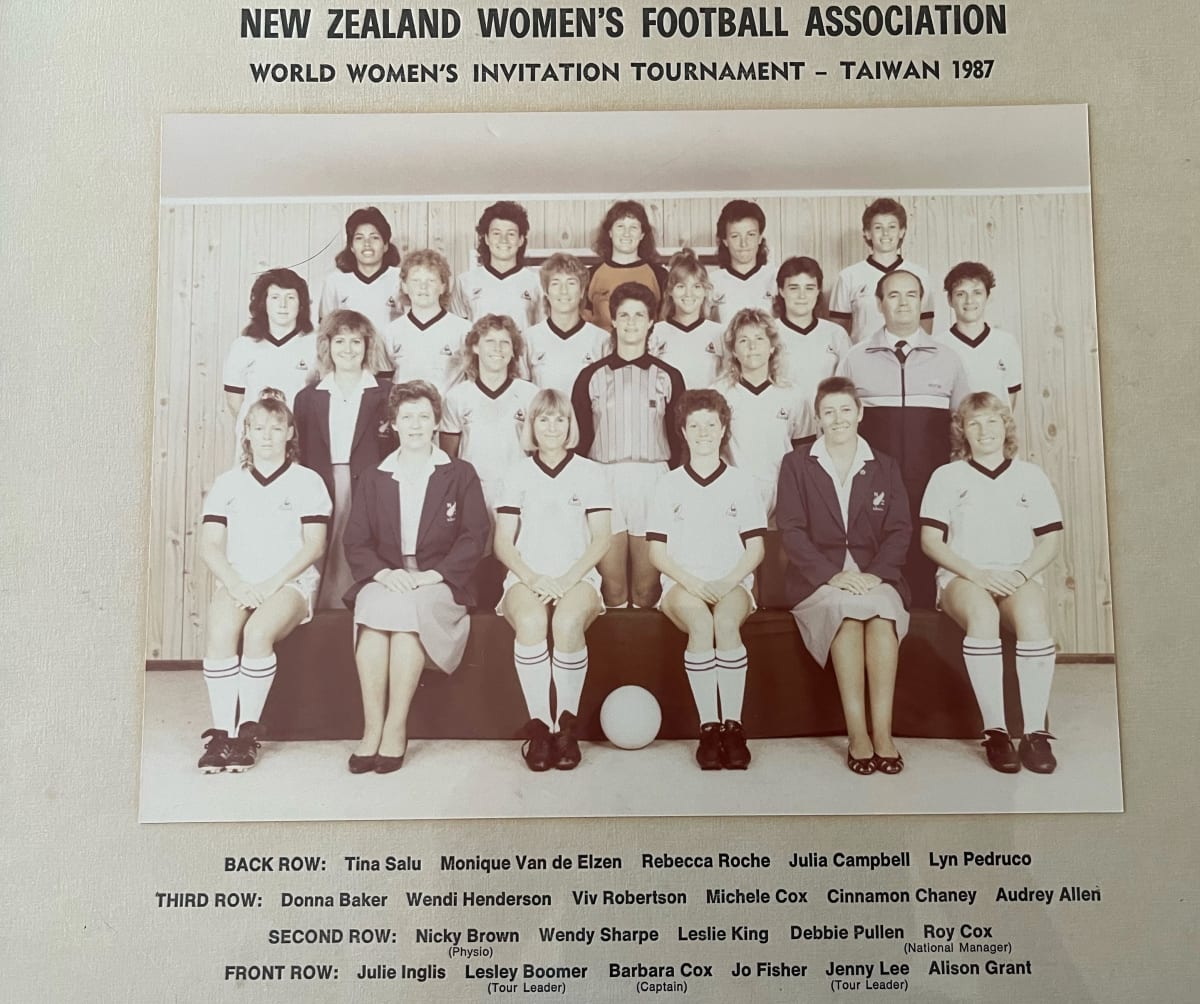
From trailblazing inaugural triumphs in the 1970s to a recent dearth of victories and goals, the Football Ferns have seen it all, writes Jeremy Ruane. Now they get to play in a FIFA World Cup at home.
Although there is evidence of women’s football being played in New Zealand as long ago as 1917, it wasn’t until 1973 that official club-based women’s league competitions were established in Auckland, Wellington and Christchurch.
Two years later, the Auckland Women’s Football Association received an invitation from Asia requesting New Zealand’s participation in the 1975 Asian Cup. This ultimately brought about the formation of the New Zealand Women’s Football Association (NZWFA) and the national team.
Roy Cox, widely regarded as the driving force behind the NZWFA’s establishment, instigated all sorts of fundraising schemes for the NZ squad’s pioneering trip to Hong Kong.
Dave Farrington was charged with coaching the team which, captained by Barbara Cox, played four hour-long matches, per FIFA rules for women at the time. They overcame the host nation 2-0, Malaysia 3-0, Australia 3-2 and Thailand 3-1 in a final watched by 12,000 spectators, with Marilyn Marshall scoring twice before Nora Hetherington’s penalty ten minutes from time clinched the silverware.
Following that trailblazing triumph, the national team didn’t play again until 1979. Australia hosted the inaugural Trans-Tasman Cup series, with a 2-2 draw followed by 1-0 wins for both nations, Rosie Ah Wong’s goal ensuring NZ scored the inaugural victory in Sydney. The Kiwis hosted the event in 1980, with two high-scoring draws preceding a 3-2 scoreline in Christchurch which allowed the visitors to claim the trophy outright, the first series having been drawn.
Those matches set the trend for what has been a fiercely contested rivalry, Australia having enjoyed the edge since 1994, the last time New Zealand defeated “The Matildas”.
During the 1980s, Taiwan hosted the tri-annual Women’s World Invitational Tournament, with the leading women’s footballing countries of the day playing daily in a week-long tournament in which New Zealand fared rather well in their three outings.

Dave Boardman’s squad brought home the runners-up trophy in 1981, a feat matched by Roy Cox’s side six years later, when arguably New Zealand’s most famous victory of all was recorded, Ali Grant’s goal earning a 1-0 win over a USA side featuring women’s footballing giants Michelle Akers and Mia Hamm.
As well, the Oceania Nations Cup was launched in 1983, with Cox’s charges securing the silverware courtesy a thrilling 3-2 triumph over Australia. This eventually became the regional qualifying tournament for the FIFA Women’s World Cup, which was introduced in 1991.
The first Finals took place in China, and New Zealand overcame Papua New Guinea and Australia to earn the right to be Oceania’s representatives. Alas, sobering losses to Denmark, Norway and the host nation were recorded in the Finals, Kim Nye scoring our only goal of the Finals against China.
Worse was to follow in the next fifteen years. Heavy defeats were inflicted by the likes of Germany, the USA, China, North Korea (11-0 – our biggest ever loss) and Japan, while a 1-1 home draw with PNG in 1996 was particularly galling, as was the national body seeing fit to deny our players the chance to even qualify for the 2004 Olympics.
There was a spell during which the national team played just five matches in four and a half years – dark days indeed for NZ women’s football, which only ended after Australia’s switch to the Asian confederation in 2006 opened the door for New Zealand to take on the world at all levels.
This meant the national body had no alternative but to invest in the women’s game in order for us to be competitive on the world stage, because NZ would be flying the flag for Oceania women’s football going forward. The 2006 FIFA U-20 Women’s World Cup in Russia saw an age-grade New Zealand women’s team making the first of many Finals appearances at both this and U-17 level, with our nation hosting the inaugural FIFA U-17 Women’s World Cup Finals in 2008.
New stars in Rosie White and Annalie Longo were among many who followed in the footsteps of Maureen Jacobson and Michele Cox, the first Kiwi women to play professionally in Europe in the late 1980s.

The Football Ferns went from famine to feast with a diet of at least 10 internationals per year from 2007 onwards. They swiftly made their mark on the world stage with numerous impressive results, the pick of which saw them qualifying for the 2012 Olympics quarter-finals, before beating Brazil and China to win the Valais Cup a year later.
Supplementing their efforts were the 2014 FIFA U-20 quarter-finalists, the Junior Ferns, and the Young Ferns, who, inspired by Anna Leat’s goalkeeping exploits, incredibly finished third at the 2018 FIFA U-17 Finals, one of the greatest achievements in NZ’s footballing history.
Five years on, New Zealand welcomes the world once again, this time as co-hosts, with Australia, of the ninth FIFA Women’s World Cup Finals. It is a massive fillip for the nation to welcome the biggest global event in women’s sport to our shores, with our own Football Ferns firmly in the spotlight as they seek to win a first-ever game in this tournament and advance to the knockout stages.
Norway, in the Finals’ opening fixture at Eden Park, the Philippines and Switzerland stand in the way of Jitka Klimkova’s charges, who couldn’t face a greater challenge.
But buoyed on by the Kiwis they represent, the Football Ferns are primed and ready to go beyond greatness as they bid to fulfil their FIFA Women’s World Cup dreams







